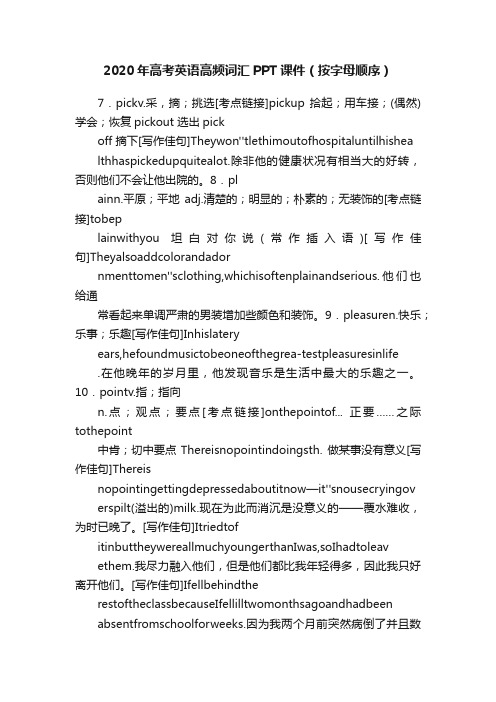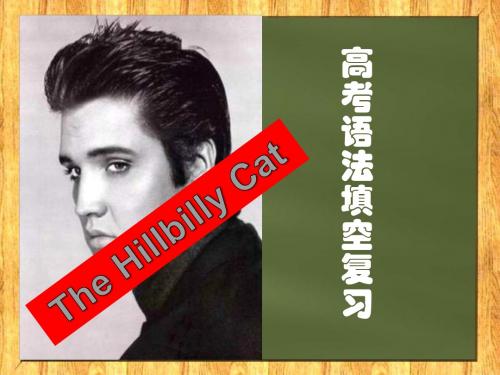2020届高考英语词汇复习课件:已考的和可能要考的易混词辨析 (共31张PPT)
高三英语一轮复习记忆易混词课件

二
4.perceive v.感知,认为,察觉到,将…视为 5.pernicious adj.有害的,恶性的(尤指潜移默化地) 6.persevere v.持之以恒,坚持,孜孜以求 eg:①There are four pernicious phases that can kill a relationship. 有四种有害的阶段能够扼杀一段关系。 ②One who perseveres to the end will surely succeed. 只在坚持到底,就一定能够成功。 ③She perceived that all was not well. 她意识到并非一切都顺利。
八
1.sleeper[ˈsliːpə(r)] n.卧铺;睡得…的人;卧铺列车 2.sleepless[ˈsliːpləs] adj.没有睡觉的;不眠的 3.sleepover[ˈsliːpəʊvə(r)] n.聚会; 4.sleepwalk[ˈsliːpwɔːk] vi.梦游; 5.sleepwalker[ˈsliːpwɔːkə(r)] 网络梦游者;梦游 6.oversleep[ˌəʊvəˈsliːp] vi.睡过头;睡得太久
拓展:intrusion n.侵入 intrusive adj.侵入的 intruder n.侵入者
九
2. extrude v.(被)挤压出,(把金属或塑料)挤压成 eg: The lava extruded from the volcano forms a conical dome in the crater. 从火山口喷出的熔岩在火山口形成了一个锥形的圆顶。 拓展: extrusion n.挤压;挤出 extrusive adj.挤出的;喷出的
一
9. 10.excerpt n.节选,摘录;v.摘录,摘要,引用,节要
2020年高考英语高频词汇PPT课件(按字母顺序)

2020年高考英语高频词汇PPT课件(按字母顺序)7.pickv.采,摘;挑选[考点链接]pickup 拾起;用车接;(偶然)学会;恢复pickout 选出pickoff 摘下[写作佳句]Theywon''tlethimoutofhospitaluntilhishealthhaspickedupquitealot.除非他的健康状况有相当大的好转,否则他们不会让他出院的。
8.plainn.平原;平地adj.清楚的;明显的;朴素的;无装饰的[考点链接]tobeplainwithyou 坦白对你说(常作插入语)[写作佳句]Theyalsoaddcolorandadornmenttomen''sclothing,whichisoftenplainandserious.他们也给通常看起来单调严肃的男装增加些颜色和装饰。
9.pleasuren.快乐;乐事;乐趣[写作佳句]Inhislateryears,hefoundmusictobeoneofthegrea-testpleasuresinlife.在他晚年的岁月里,他发现音乐是生活中最大的乐趣之一。
10.pointv.指;指向n.点;观点;要点[考点链接]onthepointof... 正要……之际tothepoint中肯;切中要点Thereisnopointindoingsth. 做某事没有意义[写作佳句]Thereisnopointingettingdepressedaboutitnow—it''snousecryingoverspilt(溢出的)milk.现在为此而消沉是没意义的——覆水难收,为时已晚了。
[写作佳句]ItriedtofitinbuttheywereallmuchyoungerthanIwas,soIhadtoleavethem.我尽力融入他们,但是他们都比我年轻得多,因此我只好离开他们。
2020高考英语专题复习 熟词生义课件 (共23张PPT)

巩固练习: Why are you being so mean to me? 释义:___________
熟词生义 1
定语
主语 谓语
3. The likables’ plays-well-with-others qualities strengthen
advertise (v.) 做广告
(v.)广告某件事,告知
熟
3.The post has since gained the attention of social media users all 词
over the world, receiving more than 184,000 shares and 61,500
friendships, jump-start interpersonal skills and, when tapped early, are employed ever after in life and work. (阅读D) 4. Modern methods of tracking polar bear populations have been employed only since the mid-1980s,….(语法填空) 5. Further up, the weather changes— low clouds envelop the mountainsides, which are covered with thick grass. I count twelve shades of green from where I stand. (完型)
熟词生义 1
1.Chris trips on the “-ld,” a pronunciation difficulty for many non-native English speakers.(2019全国I 阅读B)
高三年级高考语法填空复习课件(共33张PPT)

Tips:非谓语的形式一定要考虑 它与其逻辑主语之间 的关系。
done
在句中充当除谓语以外的 句子成分的动词形式叫做 非谓语动词
不定式 一般式
主动式 to do
被动式
to be done
to be being done
to have been done
进行式
完成式
to be doing
to have done
Tips
:若括号中给出的动词为谓语 动词,考点为时态和语态,时态考虑 要瞻前顾后。
动词 (do-did-done)
1.build 2.bring 3.steal 4.sing 5.blow 6.catch send spend buy fight speak forget drink ring throw know teach lend rebuild think freeze choose begin sink grow fly
Conclusion
提示词
动词时态语态,非谓语动词, 单复数,词性转换,形容词 或副词的比较级或最高级, 主谓一致
介词,连词,代词,冠词, 从句引导词,固定句型短语
无提示词
1.动词考点 1.Young Beethoven ________ was told(tell) that he had no talent for music, but he ________ gave (give) some of the best music to the world.
2.非谓语动词考点
1.He became well known and people would visit to see him just _____________(see)his creation. 2.For example, in the picture book written _______________ (write)by Rania, the author illustrates the friendship. Born 3._________(bear) in London, Greiner graduated from MIT. ter the team saw these the same monkeys living (live) in the wild. ______
2020年高考英语---高频单词解析

2020年高中英语总结1.able 用法:be able to doNote: 反义词unable表示不能,而disabled表示残疾的。
be able to do可以表示经过艰难困苦才能做到的事。
2.abroad 用法:表示到(在)国外,是一个副词,前面不加介词。
Note: 可以说from abroad, 表示从国外回来。
3.admit 用法:表示承认的时候后面要加上动名词形式。
Note: 表示允许进入的时候与介词to搭配。
4.advise 用法:advise sb. to do; advise doingNote: 后面的宾语从句要用虚拟语气。
即:advise that sb. (should) do 的形式。
5.afford 用法:通常与动词不定式搭配使用。
Note: 前面需要有be able to或can等词。
6.after 用法:表示在时间、空间之后;be after表示追寻。
Note: 用在将来时的时候后面接一时间点,而in接一个时间段,如:after 3 o’clock; in 3 days.7.agree 用法:与介词on, to, with及动词不定式搭配。
Note: agree on表示达成一致;agree to表示批准;agree with表示同意某人说的话。
8.alive 用法:表语性形容词,在句中只能作表语,不能作定语。
Note: 可以作状语使用,表示活活地,如:bury sb. alive.9.allow 用法:allow doing; allow sb. to doNote: 可以表示允许进入,如:Please allow me in.10.among 用法:用在三者或三者以上的群体中。
Note: 还可以表示其中之一,如:He is among the best.11.and 用法:用于连接两个词、短语、句子或其他相同结构。
Note: 与祈使句搭配时往往可以表示条件。
(新高考)2020版高考英语二轮复习第四编考前要点再排查三高考常考词词性变化课件新人教版

advise→advice 建议 present→presence 出席 convenient→convenience 方便 diligent→diligence 勤奋 distant→distance 距离 important→importance 重要 independent→independence 独立 innocent→innocence 天真,无辜 intelligent→intelligence 智力 violent→violence 暴力
perform→performance 履行 resist→resistance 抵制 insure→insurance 保险 assist→assistance 帮助 tolerate→tolerance 容忍
(2)-tion, -sion 结尾的名词 introduce→introduction 介绍 describe→description 描述 interrupt→interruption 打断 direct→direction 方向,指导 connect→connection 连接 starve→starvation 挨饿 realize→realization 实现,领悟 invite→invitation 邀请 produce→production 生产
(7)-ure 结尾的名词 please→pleasure 快乐 fail→failure 失败 mix→mixture 混合 press→pressure 压力 depart→departure 离开 expose→exposure 暴露 sign→signature 签名 (8)-ce 结尾的名词 absent→absence 缺席 confident→confidence 自信 different→difference 不同 evident→evidence 证据 patient→patience 耐心 silent→silence 沉默
2020届高考英语词汇复习课件:高考完形填空选项高频词 (共64张PPT)

序号 单词 次数
基本意思
12 _c_h_a_n_g_e_
v.改变;交换,兑换 5 n.变化;零钱
(change sb’s _m__in__d__改 变主意;_fo__r a change为 变化)
adj. 好奇的;爱管闲事 13 _c_u_r_io__u_s 4 的;不寻常的
v.经过;传递;流逝
5 n.及格 [_p_a_s_si_n_g_短暂的; pass_a_w__a_y =die去世; pass _b_y_ 路过
序号 单词 次数
基本意思
adv.好;满意地;完全 6 __w_e_l_l___ 5 地 adj.健康的 n.井 vi.流
出 (know him veryw__e_ll_ 十分了解他)
本部分将12年出现了2次以上的 152个单词罗列出来,它们在完形填空
的语篇中考查的都是很基础很常见的用法 和意思。有了这个汇总表,在一定程度上 可以帮助学生更有针对性地去记忆单词, 也更加提醒我们尤其要抓好实词常见的基 础用法和意义。
序号 单词 次数
基本意思
1 _l_e_a_r_n___
v. 学习;获悉
常赞同。) [反]d__is_a_g_r_e_e,
_o_b_j_ec_t__
adv. 然而
9 _h_o_w__e_v_e_r 5 conj.无论如何; 不管多么 (We’ll have to finish it,
_h_o_w_e_v_e_r__ long it takes.)
序号 单词 次数
基本意思
10 __tu__rn_
v.转动; 变成 5 n.转弯处;转折点
高考英语词汇复习课件:已考的和可能要考的易混词辨析

well well
2020届高考英语词汇复习课件:已考 的和可 能要考 的易混 词辨析 (共31张PPT)
2020届高考英语词汇复习课件:已考 的和可 能要考 的易混 词辨析 (共31张PPT)
2020届高考英语词汇复习课件:已考 的和可 能要考 的易混 词辨析 (共31张PPT)
7. no与not
no (=not any, not a) 是形容词,修饰名词 (不可数名词、可数名词单复数); not是副词,与情态动词、助动词、be构
成否定式;与非谓语动词构成否定式; 用于believe, hope, except, trust等词后替 代that引导的否定从句。
much.
(5) I’m sorry to disturb you _s_o__ early.
(6) I’m not sure if I’ll succeed, but I certainly hope
_s_o____.
2020届高考英语词汇复习课件:已考 的和可 能要考 的易混 词辨析 (共31张PPT)
成否定式;与非谓语动词构成否定式; 用于believe, hope, expect, trust等词后替 代that引导的否定从句。
(4) He pretended __n_o_t__ to know the facts. (5) There is __n_o__ access to the street through that
_s_u__c_h__ cases are reported.
2020届高考英语词汇复习课件:已考 的和可 能要考 的易混 词辨析 (共31张PPT)
高考英语复习易混词辨析练习课件(七)(20张PPT)

especially in remote rural areas.
This book is designed in the form of Q&As to address some possible COVID-19-related psychological problems of children, with a view to helping them learn to cope with such problems while enjoying themselves in reading. In addition, this book is carefully illustrated by a group of young artists who have applied psychological intervention techniques into their illustrations. Also, with the help of this book, parents can learn how to explain the outbreak to their children in a
prospect
perspective
Aerial photo (航拍照片)taken on April 15, 2020 shows the construction site of an interchange at Chongqing Hitech Zone in Chongqing, Southwest
possible.
very young entrepreneurship sits at the
高三英语话题词汇复习PPT课件

.
3
高考评分标准
第一档 优秀(18 – 20分):完全完成了试 题规定的任务。
• 覆盖了所有内容要点;
• 运用了多样的句式和丰富的词汇;
• 语法或用词方面有个别错误,但为尽可能 表达丰富的内容所致;体现了较强的语言 运用能力;
• 有效地使用了语句间的连接成分,所写内 容连贯、结构紧凑。
• 完全达到了预期的写.作目的。
.
21
重点词
汇复习 Practice makes perfect.
一、 witness
1. We call a person who sees a crime or an accident and can describe what happened a ___w_i_tn_e_s_s______.
15
Vocabulary related to describing an accident
The process
11. _____c_a_l_m__d_o_w_n____ 冷静下来
12. ______sw__if_t_ly_______ 迅速地
13. ______am__b_u_l_a_n_c_e___ 救护车
4. Your suggestions are not __i_n__h_a_r_m__o_n_y_ _w_i_th__ the aims of this project. (和…不符)
5. Russia and America cannot really deal with each other__h_a_r_m_o_n_i_o_u_s_l_y.俄罗斯和美国这两 只猛兽不可能真心实意地和谐相处。
14. ______d_ia_g_n_o_s_e_____ 诊断
2020考研英语词汇精讲ppt课件

(innovate革新,innovative创新的) • renovate=re(again反复)+ nov + ate反复的更新,“翻新”
• bibliography • biblio=bible基督教的《圣经》,包含《旧约全书》和《新约全书》,词根表示book • mania 狂热(症)那么把biblio和mania放在一起bibliomania 藏书癖
• graph=write • 因此bibliography表示把所有的书目写下来,即“参考书目”
12
词根词缀记忆法
• cap=catch,cold,head • capture“抓捕,俘虏”; • escape=es(out)+ cap(catch) + e“逃跑” • capsule“胶囊”其中的cap表示hold盛载盛装 • 在构词法中cap=cab • cab“出租车” • captain“船长”,其中的cap=head头 • capital“首都;首写字母;资金”,其中的cap=head • cabbage卷心菜,大头菜。“上酸菜”server pickle cabbage
8
词根词缀记忆法
• 一个男孩邀请一个女孩吃烛光晚餐,女孩说“我今天已经有约会了”, 这个男孩一定非常痛苦,问女孩“难道不能给我一个机会吗”,女孩说 “其实你很好,但我不能跟你在一起”,这种拒绝就叫做“decline”。
• 但如果女孩说“我不跟你去,你以后不要再来找我了。”这种拒绝就是 “refuse”了。
2024届高三英语一轮复习:高考易考熟词僻义+课件

1.twin n.双胞胎之一 eg:She's expecting twins. 她怀着双胞胎。
2.twin adj.成对的,成双的 eg : The twin spire of the church fully embodies its Gothic architectural style. 教堂的双尖顶充分体现了它的哥特式建筑风格。
1.state n.国家,州 eg:Education is provided by the state as of right. 受教育是国家赋予每一个人的权利。
2.state v.规定,陈述 eg: You will each be given the chance to state your case. 你们每人都有机会陈述理由。
2.suggest v.表明,暗示 eg: Are you suggesting (that) I'm lazy? 你言下之意是说我懒?
1.associate v.联想,联系 eg: Through science we've got the idea of associating progress with the future. 通过科学我们知道了应该把进步和未来联系起来。
1.stand v.站立,起立 eg:She was standing on one foot. 她单脚站立着。
2.stand n.(公开表明的)主张,立场 eg:In his heart he knew they'd agree with his stand. 他内心明白他们会赞成他的立场。
高考易混词识记课件高三英语一轮复习

高考易混词识记
1.owe v.欠 eg:I have every intention of paying her back what I owe her. 我一心想把我欠她的还给她。
2.own adj.自己的 v.拥有 eg:He happens to own half the land round here. 他恰好拥有这里一半的土地。
2.test n./ v.测验;考查 eg:When can I get my test results? 我什么时候可以拿到化验结果?
1.vocation n.工作,职业 eg:She is a doctor with a strong sense of vocation. 她是一位具有强烈使命感的医生。
1.unlike prep.不像 adj.不同的 eg:Music is quite unlike any other art form. 音乐与其他艺术形式迥然不同。
2.dislike v.不喜欢 eg:I dislike being away from my family. 我不喜欢同家人分开。
2.vacation n.假期 v.度假;休假 eg:Hawaii remains a popular choice for winter vacation travel. 夏威夷一直是深受人们青睐的冬季假日旅游胜地。
1.whether conj.是否 eg:She asked her boss whether she could have the day off. 她问老板可不可以让她请一天假。
1.sign n.迹象;手势;符号 v.签 (名) eg:Visitors are kindly requested to sign the book. 敬请参观者在这本册子上签名。
高考英语一轮复习:积累易混词课件

1.Rust v.(使)生锈 n.锈 Eg:Now my hammer is red with rust. 现在我的锤子长满了红锈。
2.Rush v.迅速移动;n.冲;匆忙,忙碌;亢奋感;热潮 Eg:Don't rush. Take your time. 不用急,慢慢来。
1.Theory n.理论,学说,理论基础,观点 Eg:That theory is known as evolution through natural selection.这一 理论被称为一一自然选择进化论。
2.Grand adj.壮丽的;宏伟的;极好的 Eg:They say it's to be a grand celebration. 他们说这会是场盛大的庆典。
1.Underlie v.构成···的基础,作为···的原因 Eg:We could test for 10 of these oncogenes that we know underlie lung cancer. 我们能化验出导致肺癌的十种致癌基因。
发挥学科组集体备考的优势,学科组内任务分解、责任到人,每次考试变 式训练的预测由组长把关。学科组坚持“一课一研”、“一考一研”,新老教师步调 一致,节奏有序,充分发挥分工协作的集体教研智慧。
三是找准学科增分点 认真研究本省、本市、本校近年来的高考数据,细化到每一个知识点的得
失分情况,找准突破点和增分点,有目的进行专项训练和突破提升。英语的阅 读理解和小作文、语文的古文分析和作文、理科的做题速度、文科的答题思路 等,都要制定详细的训练方案和突破的方法策略,在实践中调整提升,打破制 约瓶颈,找到质量提升的突破口。
2.Therapy n.疗法,治疗;心理治疗 Eg:Uh, actually, Dr. Whale wants me to start physical therapy.嗯, 事实上,威尔医生让我开始进行理疗。
- 1、下载文档前请自行甄别文档内容的完整性,平台不提供额外的编辑、内容补充、找答案等附加服务。
- 2、"仅部分预览"的文档,不可在线预览部分如存在完整性等问题,可反馈申请退款(可完整预览的文档不适用该条件!)。
- 3、如文档侵犯您的权益,请联系客服反馈,我们会尽快为您处理(人工客服工作时间:9:00-18:30)。
3. very与
very修饰形容词或副词的原级;
much(作副词) much修饰动词,以及形容词或
副词的比较级。
(1) I know he hasn’t finished, but, after all, he is _v_e_r_y___ busy. (2) He adjusted himself _v_e__ry___ quickly to the
(1)If you __e_v_e_r__ need any help, just let me know. (2)“Have you _e_v_e_r__ thought of changing your
job?” “No, never.”
(3)This is the most interesting novel that I have
_e_v_e_r__ read.
(4)He has __n_e_v_e__r_ been abroadnot a) 是形容词,修饰名词 (不可数名词、可数名词单复数); not是副词,与情态动词、助动词、be构
成否定式;与非谓语动词构成否定式; 用于believe, hope, except, trust等词后替 代that引导的否定从句。
(3) She is _s_u_c_h__ a nice girl that everyone likes her
very much.
(4) The girl is _s_o__ nice that everyone likes her very
much.
(5) I’m sorry to disturb you _s_o__ early.
much of our precious time for study.
(2)I have some classical novels but not _m__a_n_y__.
(3)There was so _m_u__c_h__ traffic that we got to
school an hour late.
(1) He told them about the job he had left. __S_u_c__h_
information was just what they needed.
(2) This isn’t the only story of starving children. Many
_s_u__c_h__ cases are reported.
已考的和可能要考的
易混词辨析
在高考英语全国卷的短文改错中, 常会考查一些常用的易混词辨析,现将 其归纳如下:
1. many与
many修饰或代替可数名词(复数);
much (不定代 much修饰或代替不可数名词(单数)。
词)
(1)Too _m__a_n_y__ after-class activities take up too
heat of the country. (3) She looks _m__u_c_h_ prettier with long hair than
with short hair.
4. very much与very very much意为“非常”;
well(修饰动词)
very well意为“十分, 完全,
(6) I’m not sure if I’ll succeed, but I certainly hope
_s_o____.
ever表示“在任何时候;曾,曾 经”(用于疑问句、否定句,或表 6. ever与never 示怀疑或条件的句中;与比较级 than或最高级连用); never表示“从未,永不”。
(1) We toured France about three years __a_g_o___.
(2) He said he had seen the film two days
__b_e_f_o_r_e__.
(3) I have seen you__b_e_f_o_r_e_ , but I can’t
彻底”。
(1) I’m sure that everybody will miss him
very__m_u__c_h_ .
(2) I don’t know these people very _w__e_ll__.
such是形容词,用来修饰名词(名词前面 可以加形容词,也可以不加),如果修饰 单数可数名词,其后加不定冠词a或an; 5. such与so so是副词,用来修饰形容词或副词;此 外,so还可用于think, believe, suppose, hope, say, do等词的后面,代替前句内容, 以避免重复。
(1) She could __n_o_t__ account for her mistake. (2) We do _n__o_t_ think such an abnormal phenomenon
will last long.
(3) I’m _n_o__t_ accustomed to getting up so early to do
morning exercise.
7. no与not
no (=not any, not a) 是形容词,修饰名 词(不可数名词、可数名词单复数)。 not是副词,与情态动词、助动词、be构
(4)The children never eat very _m__u_c_h__, but they
seem quite healthy.
2. ago与 before (作副 词)
ago放在时间段后,表示离现在多 久之前,常与一般过去时连用;
before是相对过去某个时间或动作 来说多久以前,常与过去完成时连 用。before还可单独使用,常与完 成时连用。
such是形容词,用来修饰名词(名词前面可以
加形容词,也可以不加)。如果修饰单数可数
名词,其后加不定冠词a或an。
5. such 与so
so是副词,用来修饰形容词或副词;此外, so还可用于think, believe, suppose, hope, say,
do等后面,代替前句内容,以避免重复。
